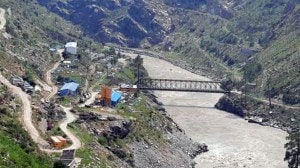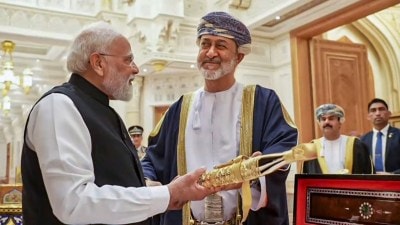Underlining that the key question for any determination under the Places of Worship (Special Provisions) Act, 1991 is the religious character of a place of worship as it existed on August 15, 1947, the Supreme Court Friday declined to stop the survey of the Gyanvapi mosque complex in Varanasi by the Archaeological Survey of India (ASI).
The survey — it began Friday — was ordered by the Varanasi District and Sessions Court on July 21 and upheld by the Allahabad High Court on August 2.

While the district court order allowed excavation if necessary, the ASI assured the High Court that it will not resort to excavation or any method that will in any manner damage the existing structure.
Upholding the High Court order, a three-judge bench, presided by Chief Justice of India D Y Chandrachud, directed that “the entire process shall be concluded through any non-invasive methodology”. The bench was hearing a plea by the Anjuman Intezamia Masajid Committee which had challenged the survey order.
“The order of the learned trial judge… cannot prima facie at this stage be construed to be without jurisdiction… The HC was, in our view, correct in introducing certain specific directions to circumscribe the nature of the order which was passed by the district judge. Reading the directions which have been issued by the district judge, it is apparent that they would be amenable to carrying out an excavation at the site. However, during the course of the proceedings before the HC, the ASI has clarified on affidavit that it was neither carrying out any excavation nor would the survey involve any destruction of the property,” the bench, also comprising Justices J B Pardiwala and Manoj Misra, said in its order.
Recording the statement of Solicitor General Tushar Mehta “to the effect that the survey shall not involve any excavation at the site or any destruction of the structure”, the bench directed “that the entire process shall be concluded through any non-invasive methodology that may be adopted by the ASI. We reiterate the direction of the HC that there shall be no excavation at the site which was in accord with the statement which was made before the HC by the Additional SG, and which has been reiterated in the submissions made by the SG before this court on behalf of the ASI”.
It said that “the report which will be prepared by the ASI shall… be remitted to the trial court and shall thereafter abide by the directions that shall be passed by the District Judge at the trial of the suit”.
Story continues below this ad
Appearing for the mosque committee, Senior Advocate Huzefa Ahmadi opposed the decision for an ASI survey, saying it was done even before deciding the preliminary issues involved in the civil suit and that it violated the Places of Worship Act.
Referring to the objects and reasons of the Act, he pointed out that it says that the religious character of a place will remain the same as it was on August 15, 1947.
To this, the CJI said, “So, there are two bars. Section 3 is the bar on converting any place of worship of any religious denomination or any section into a place of worship of a different section or religious denomination, and Section 4 (1) says it is hereby declared that the religious character of a place of worship… therefore, the religious character shall not be changed. So the whole question is really on what is the religious character as on August 15, 1947”.
Hearing the Gyanvapi matter in May 2022 too, the Supreme Court had said that “ascertainment of the religious character of a place is not barred” by the Act.
Story continues below this ad
Ahmadi then referred to the Ayodhya judgement where the Supreme Court had hailed the Act. The CJI said “that is a matter for decision”.
The Supreme Court has before it a clutch of petitions challenging the constitutional validity of the Act.
Ahmadi said, “There is one passage with regard to the wounds of the past. And Your Lordships say that is the very substratum of the Places of Worship Act. Now, having a survey into those aspects will itself frustrate the objective of the Act… This was the intent of Parliament. This is something which was in the form of a promise held out to one community, that your places of worship will not be touched. And today, you have a situation where virtually this is only reduced to a homily.”
The CJI said, “Therefore, we are keen to ensure that the mosque should not be touched. We had made it clear when it was sent back (earlier) to HC.”
Story continues below this ad
Ahmadi said the “survey will virtually have the effect of allowing the genie to escape from the bottle”.
The CJI asked, “Why are you apprehensive? If it goes against them, they take the consequences of the survey.”
Ahmadi said, “Survey should not have been ordered in the light of the express diktat of the Places of Worship Act and the object with which it was conceived as interpreted by Your Lordships.”
He said there will now be applications saying something else has been discovered in some other corner and seeking permission to pray.
Story continues below this ad
“These are salami tactics. Piece by piece, trying to edge me out from my property. That’s my worry. Today, there is no order of status quo. So every time an application is made before the trial court, suppose tomorrow an application is made saying that here I found a deity, allow me to do my worship, you are encroaching into my area,” he said.
At one stage, Ahmadi asked whether the court will allow a survey if someone files a “wholly frivolous” suit and claims that something was found underneath.
The CJI told him: “What’s frivolous to you is faith to the other side. How can we comment on whether it’s frivolous?”.
Trying to allay apprehensions over the survey, the bench said “the evidentiary value of any report of a commissioner is a matter to be tested in a suit and is open to objections including cross-examination. Hence, a report of the commissioner does not by and of itself amount to a substantive finding on matters in dispute and is subject to the process of the court during the course of the trial”.
Story continues below this ad
It said that “at this stage” it “must notice that the district judge, while acting as a trial judge in the suit, has exercised discretion… to direct a scientific investigation by ASI. The HC has found no reason to interfere, having set out the legal position… At the same time, the HC has introduced certain safeguards which need to be reiterated in the course of the present judgement of this court”.
“Having regard to the nature and ambit of a court appointed commissioner, we are unable to differ with the view of the High Court particularly while exercising the jurisdiction under Article 136 (power to grant special leave to appeal) of the Constitution,” it stated.









